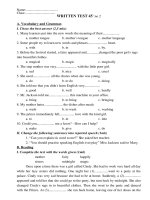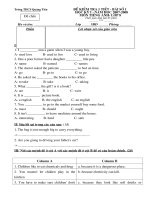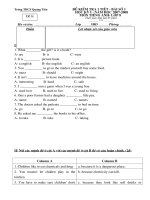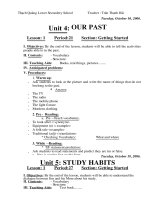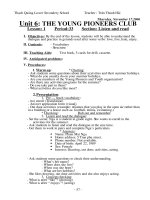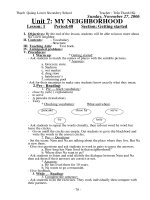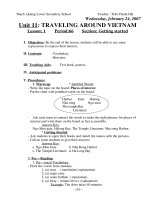T. ANH 8 BAI 8
Bạn đang xem bản rút gọn của tài liệu. Xem và tải ngay bản đầy đủ của tài liệu tại đây (80.29 KB, 13 trang )
Th¹ch Qu¶ng Lower Secondery School Teacher : TrÇn Thanh H¶i
Sunday, November 27, 2006
Unit 8: country life and city life
Lesson: 1 Period:46 Section: Getting started
I. Objectives : By the end of the lesson, students will be able to talk about city life
and country life.
II. Contents: - Vocabulary
- Structure:
III. Teaching Aids: Text book.
IV. Anticipated problems:
V. Proceduces:
1. Warm up: * Chatting:
- Talk to students about life in the city and life in the country by asking some
questions.
a. Where do you live?
b. Do you want to live in the city? Why?
c. Do you want to live in the country? Why?
2.Pre - Reading:
1. Pre – teach vocabulary :
- A relative (example)
- Peaceful (synonym)
- Permanently (explanation)
- Accessible (translation)
- Medical facilities (translation)
* Checking vocabulary: Rub out and remember.
2. Brainstorming (getting started)
- Get students to talk about city life and country life. The words in the box of
getting started may help them.
Noisy Quiet
City life Country life
* Possible answers:
- Tall buiding - beautiful views - busy
- plenty kinds of goods - fresh food
- polluted air - fresh air
- traffic jams - friendly
- entertainment - peacepul
- 83 -
Th¹ch Qu¶ng Lower Secondery School Teacher : TrÇn Thanh H¶i
3. While – Reading:
- Ask students to read the dilogue between Na and Hoa and compare their ideas.
- Give feedback and get more information.
1. Comprehension questions.
- Get students to work in pairs to answer the questions in exerise 2.
* questions and answers
a. Where has Na been?
Na hs been to Kim Lien village.
b. How long was she there?
She was there for the weekend.
c. What is her opinion of the countryside?
To her, the countryside is peaceful and quiet and there is nothing to do.
d. Na says “ there is nothing to do”, what does she mean by this?
There is no libraries no movies, no supermarkets, no zoos……
e. What are some of the changes that Hoa mentions?
Country life is becomng better. Many remote area are getting electricity.
People can now have things like refrigerators and TV, medical facilitis are more
accessible.
- Ask students work in pairs to answer the questions.
- Ask some pairs to practice the dialogue.
4. Post – Reading:
2. Discussion.
- Divide the class in to 4 groups. Two groups include students who prefer the city
life and the others include students who prefer the counry life.
- Ask students to work in groups to answer the questions.
Do you prefer the city or the country life? Why?
- Ask 4 pioneers from 4 groups to show their ideas before class.
5. Homework:
- Ask students to write as short passage about why they prefer the city life or the
country life.
- 84 -
Th¹ch Qu¶ng Lower Secondery School Teacher : TrÇn Thanh H¶i
Unit 8: country life and city life
Lesson: 2 Period:47 Section: Speak
I. Objectives: By the end of the lesson, students will be able to practice speaking
about the changes of a place.
II. Contents: - Vocabulary
- Structure:
III. Teaching Aids: Text book, pictures, poster.
IV. Anticipated problems:
V. Proceduces:
1. Warm up: * Word square:
Ask students to find 7 adjectived.
E X P E N S I B
O A M D N U V E
U B O I S V E A
I C D R T R U
Y L E T L L A T
S M R Y H G I
U O N O I S Y F
B P T F D E L U
- Divide the class in to 2 teams…
- Ask students to go to the board and circle the word they find.
- The team which circles more words will win the game.
* Answers:
Modern, dirty
Busy
Noisy
Tall
Expensive
beautiful
2. Presentation:
- Setting the scene: “ Hoa’s grandmother is 78”.
- Five years ago, she was 73 and she was stronger than she is now.
- Ask students to make a sentence about her helth.
- Hoa’s grandmother is getting weaker.
- Explain the form – use of the present progressive tense.
* Form: am/ is/ are + V-ing
- 85 -
Th¹ch Qu¶ng Lower Secondery School Teacher : TrÇn Thanh H¶i
* Use: used to describe changes with “get” and “become”
3. Practice: * Drill.
- Prepare 6 cards of cues
a. The boys/get/tall
b. The old men/become/weak.
c. It/become/dark
d. The weather/get/cold
e. The students /get/better
f. The school yard/become/cleaner.
- Model first two cues, the whole class repeat chorally, then some students read out
individually.
- Give a new cue, a ask new students to repeat.
- Go on until most of the students in class can remember the stucture.
* Answers:
a. The boys are getting tall.
b. The old men are becoming weak.
c. It is getting dark.
d. The weather is getting cold.
e. The students are getting better.
f. The school yard is becoming cleaner.
4. Production:
1. Speaking 1:
- Ask students to look at the two pictures and talk to their partners about the changes
of the town. The words in the box under the pictures may help students
- Write the word prompts on the bord so that students can speak easily.
Eg: Traffic busy sky
Cloudy housea high
Green City beautiful trees
* Possible answers:
+ The traffic is getting busier.
+ There are more tall buildings and houses.
+ The houses are getting more modern.
+ The town is becoming more beautiful.
+ There are more green trees.
+ The streets are becoming cleaner/larger/noisier.
+ Goods are getting more expensive.
2. Speaking 2:
- Ask students to work in groups and talk about changes in their home town/
neighborhood.
- Call on volunteer from each group to show their ideas before the class. Other
groups can add in their ideas.
4. Homework:
- Ask students to writes some sentences,using present progressive tense to decibe
changes in their school.
Unit 8: country life and city life
- 86 -
Th¹ch Qu¶ng Lower Secondery School Teacher : TrÇn Thanh H¶i
Lesson: 3 Period:48 Section: Listen
I. Objectives: By the end of the lesson, students will be able to complete the
dialogue by listening and further practice in present continuous to talk about the
future.
II. Contents: - Vocabulary
- Structure:
III. Teaching Aids: Text book, cards.
IV. Anticipated problems:
V. Proceduces:
1. Warm up: * Matching:
- Prepare eight cards with phrases on them.
- Write eight verbs on the board ( play, do, watch, go, clean, have, phone, speak).
- Divide the class in to two teams.
- Hand out each team 8 cards.
- Ask students to stick the cards with phrases besides the suitable verbs:
Ex: play – table tennis.
- The team which is faster is the winner.
* Answers:
Play table tennis Do my homework
Watcha program Go to violin lesson
Clean the house Have a meeting
Phone my aunt Speak to mom.
2. Pre – Listening.
- Ask students to use the suitable verbs in the present progressive tense to
complete the dialogue in the exercise 2.
- Get students to work in pairs.
- Call some pairs to practice the dialogues before class and teacher corrects.
* Answers:
a. am playing b. Are going c. am watching
d. am going e. are cleaning f. am having
- 87 -

